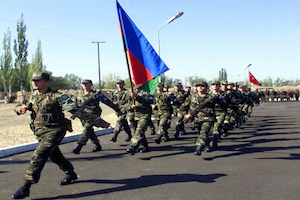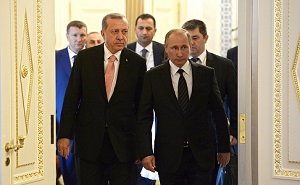Revitalizing the Military Dimension of the Azerbaijan-Georgia-Turkey Tripartite Partnership
By Ilgar Gurbanov
July 24, 2017, the CACI Analyst
On May 23, the defense ministers of Azerbaijan, Georgia and Turkey (AGT) held a trilateral meeting in Batumi, followed in June by the joint trilateral field training Caucasian Eagle 2017 of the three countries’ Special Operations Subdivisions in Georgia’s Vaziani base. The negative impact of terrorism and aggressive separatism on stability and development in the region makes it necessary to pool the capabilities of these countries to confront potential threats directed against their security and sovereignty. The AGT tripartite partnership has proven more successful than other regional integration blocs and initiatives.

Weaker Turkey leaves the South Caucasus without Strategic Anchor
By Mamuka Tsereteli
February 17, 2017, the CACI Analyst
The weakening strategic position of Turkey will have a profound impact on the Black Sea-Caspian region and wider Central Asia. An assertive Russia and diminishing U.S. and Western engagement further limits Turkey's ability to play a pro-active role in the region. For regional actors in the South Caucasus, part of the solution should be to create the best possible conditions for transiting Asian cargos via Central Asia, the Caspian Sea, the South Caucasus corridor and the Black Sea to Bulgaria and Romania. This is how countries of the South Caucasus can bring new balancing powers to the region.

Israeli PM’s visit to the two sides of the Caspian Sea
By Avinoam Idan
February 6, 2017, the CACI Analyst
Israel’s Prime Minister Binjamin Netanyahu made a landmark visit to Azerbaijan and Kazakhstan in December 2016. The Israeli Prime Minister's visit reflects Israel’s growing interest in Central Asia and the Caucasus, a region that is part of Israel's greater strategic environment. Israel's interest in Kazakhstan focuses on its trade potential, its regional and international status, and its position as a vital link in the Chinese Belt and Road Initiative. Azerbaijan's geographical location, its role as a significant energy exporter, and its security approach have been foci of the close relations that have developed between Baku and Jerusalem over the years. The Prime Minister's visit reflects the continued deepening of ties with Azerbaijan.
EU–China trade to bolster security in the South Caucasus
By Boris Ajeganov
January 23, 2017, the CACI Analyst
Foreign investment in Georgia is strengthening the country’s importance in connecting East Asia with Europe, which has positive implications for the broader region. The rise in FDI in commercial and transportation infrastructure in combination with the signing of international free trade agreements will reduce Georgia’s vulnerability in terms of economic and, ultimately, ‘hard’ security. The growing importance of the South Caucasus as node for EU-China trade will weaken Russia’s incentives to undermine its southern neighbors by military, political, and economic means as it has done in the past. Accordingly, Tbilisi’s ability to conduct an independent foreign policy is set to improve despite the absence of Western security guarantees.
Advancing Georgian-U.S. security cooperation after the Trump transition
By Richard Weitz
January 19th 2017, the CACI Analyst
The Trump administration will soon undertake a comprehensive review of Russia-US relations and U.S. policy toward the rest of Eurasia. Although the new team will presumably consider many options, the president-elect’s statements imply that the U.S. will not soon support further NATO expansion or other actions that would strongly antagonize Moscow. Despite this limitation, the U.S. government will continue security ties with U.S. partners in Eurasia, such as Georgia. In practice, there are a number of steps the U.S. and Georgia can undertake to advance their mutual security.






